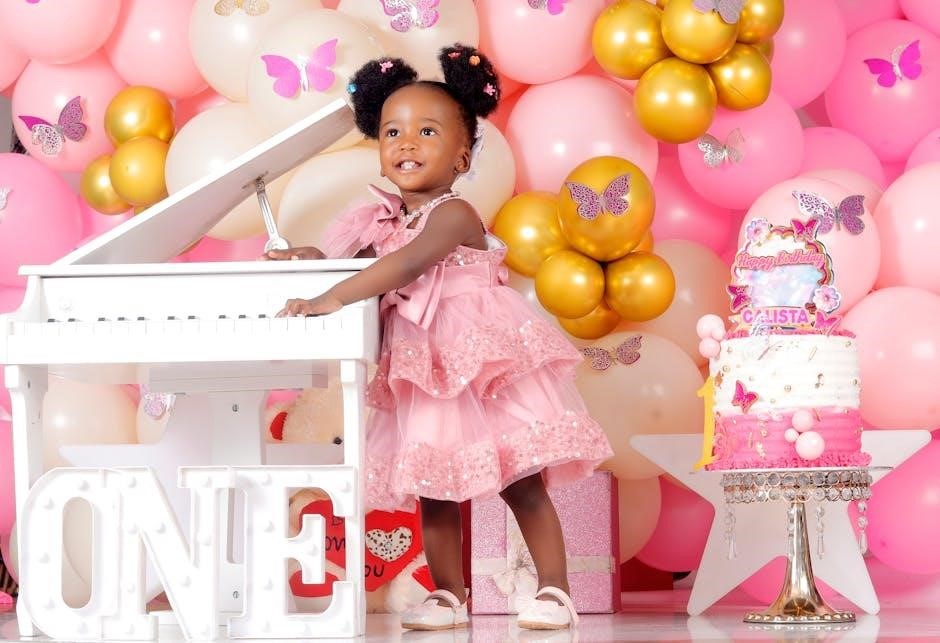The first year of parenthood is a journey of discovery‚ filled with milestones‚ challenges‚ and joy․ This guide offers expert tips and advice to navigate the first year successfully‚ covering development‚ feeding‚ sleep‚ and safety‚ ensuring you’re prepared every step of the way․

Developmental Milestones in the First Year
Track your baby’s progress through physical‚ cognitive‚ and emotional growth․ Each month brings new skills‚ from rolling and sitting to talking and walking‚ shaping their future abilities․
Physical Development
Your baby’s first year is marked by remarkable physical growth․ They begin with basic reflexes and gradually master skills like rolling‚ sitting‚ crawling‚ and standing․ By 12 months‚ most babies walk independently․ Monitoring these milestones is crucial‚ as each achievement lays the foundation for future abilities․ Regular check-ups with a pediatrician help track progress and address any concerns․ Encouraging tummy time and providing a safe environment for exploration support healthy physical development‚ ensuring your baby thrives during this transformative year․
Cognitive Development
Your baby’s cognitive development accelerates rapidly in the first year․ They begin to recognize familiar faces‚ understand simple words‚ and problem-solve‚ like figuring out how to reach a toy․ Memory and recognition skills improve‚ with babies recalling familiar objects and routines․ Sensory exploration through sight‚ sound‚ and touch enhances learning․ Interactive toys and activities stimulate curiosity‚ fostering mental growth․ By engaging with your baby and providing enriching experiences‚ you support their cognitive development‚ laying the groundwork for future learning and intellectual abilities․
Emotional and Social Development
Your baby’s emotional and social development begins with building trust through consistent care and responsiveness․ They start to show affection for familiar people and may feel secure with a comfort object․ Social milestones include smiling‚ laughing‚ and waving․ As they grow‚ babies begin to understand emotions and may exhibit separation anxiety․ They also start to test boundaries‚ leading to tantrums․ Encouraging positive interactions and remaining patient helps foster emotional regulation and secure attachment‚ laying the foundation for healthy social relationships․

Feeding and Nutrition
Feeding and nutrition are crucial in the first year‚ transitioning from breast milk or formula to solids․ Introduce single-ingredient foods to monitor allergies and gradually expand variety․ Common challenges include food refusal and texture aversions‚ but patience and consistency help establish healthy eating habits early on․
Introducing Solid Foods
Introducing solid foods is a milestone in your baby’s first year‚ typically starting around six months․ Begin with single-ingredient foods to monitor for allergies․ Iron-rich options like pureed meats or fortified cereals are recommended first․ Gradually expand variety‚ introducing one food at a time․ Signs of readiness include good head control and interest in food․ Common challenges include rejection of certain textures or tastes‚ but patience and consistency are key․ Always consult your pediatrician for personalized advice on this transition․

Weaning to Cow’s Milk
Weaning to cow’s milk typically occurs around 12 months‚ marking a significant dietary shift․ Introduce whole‚ unflavored cow’s milk gradually‚ ensuring it complements solid foods․ Monitor for signs of intolerance‚ such as digestive issues or rashes․ Avoid low-fat options until your pediatrician advises‚ as babies need the calories and fat for growth․ This transition supports calcium intake for bone development and is a natural step toward independence from breast or formula feeding․ Always consult your pediatrician for tailored guidance․
Common Feeding Challenges
Feeding challenges are common during the first year‚ with issues like bottle rejection in breastfed babies and changes in bowel movements․ Some babies may resist certain foods or show preferences early on․ Cereal snubbing and refusal of textured foods can be frustrating․ Stay calm and patient‚ as these phases are often temporary․ Offer a variety of options and consult your pediatrician if concerns persist․ Remember‚ every baby is unique‚ and what works for one may not work for another․ Tailored advice from a healthcare provider can help navigate these challenges effectively․
Sleep Patterns and Routines
Establishing consistent sleep routines helps babies thrive․ Expect challenges like early rising and nighttime turning․ Promote a soothing environment and consult your pediatrician for tailored advice to ensure safety and effectiveness․
Establishing a Sleep Routine
Creating a consistent sleep routine is crucial for your baby’s development․ Start with a calming pre-sleep activity‚ like a warm bath or reading․ Ensure the environment is dark‚ quiet‚ and at a comfortable temperature․ Gradually introduce a predictable bedtime schedule‚ adapting as your baby grows․ Be patient with challenges like early rising or nighttime wakings․ Consistency and patience will help your baby learn to self-soothe and develop healthy sleep habits‚ promoting better rest for the whole family․
Addressing Sleep Issues
Sleep challenges are common in the first year‚ with issues like sleep regressions and nighttime wakings․ Strategies such as swaddling‚ white noise‚ and consistent routines can help․ For persistent problems‚ consult your pediatrician to rule out underlying causes like reflux or discomfort․ Be patient and flexible‚ as sleep patterns evolve with your baby’s growth․ Remember‚ it’s okay to seek support and adjust your approach to ensure both you and your baby get the rest you need․

Safety and Health
Ensuring a safe environment and monitoring health are crucial․ Baby-proofing‚ preventing accidents‚ and regular check-ups‚ including anemia screenings‚ help protect your baby’s well-being․
Baby-Proofing Your Home
Baby-proofing your home is essential for ensuring your child’s safety․ Secure furniture and appliances‚ install safety gates‚ and use locks on cabinets․ Cover sharp edges‚ electrical outlets‚ and store hazardous materials out of reach․ Regularly inspect your home for potential risks and adapt as your baby grows․ Stay vigilant and update safety measures to match your baby’s increasing mobility and curiosity․ A safe environment helps prevent accidents and gives you peace of mind․
Preventing Accidents and Injuries
Preventing accidents and injuries requires constant vigilance and proactive measures․ Always supervise your baby‚ especially near water or stairs․ Secure heavy furniture and appliances to prevent tipping‚ and use safety gates for stairs and harmful areas․ Cover electrical outlets‚ sharp edges‚ and store hazardous substances out of reach․ Regularly inspect your home for potential risks and adapt safety measures as your baby grows․ These precautions help reduce the risk of accidents and create a safer environment for your child to explore and develop․
Parenting Tips and Support
Parenting tips and support are essential for navigating the first year․ Build trust through consistent routines‚ communicate openly‚ and seek guidance from family or professionals when needed․
Stimulating Your Baby’s Development
Stimulating your baby’s development involves engaging activities that promote cognitive‚ motor‚ and sensory growth․ Reading‚ singing‚ and talking encourage language skills‚ while interactive toys and playtime enhance problem-solving abilities․ Sensory experiences‚ like texture exploration and tummy time‚ aid physical development․ Consistent routines and positive interactions foster emotional growth․ Encourage curiosity by providing a stimulating environment with toys‚ music‚ and varied activities․ These efforts lay a strong foundation for your baby’s future learning and overall development․
Handling Grandparents and Other Caregivers
Handling grandparents and other caregivers requires clear communication and boundaries․ While their involvement can be loving and supportive‚ it’s important to ensure consistency with your parenting style․ Discuss your expectations openly to avoid conflicts․ Grandparents may spoil the baby‚ so gently guide them toward your routines․ Other caregivers should be briefed on feeding‚ sleep‚ and safety practices․ Building trust and open dialogue helps create a harmonious environment for your baby’s care‚ balancing emotional support with practical guidance․
Emotional Challenges of Parenting
The first year of parenting brings immense joy but also emotional challenges․ Sleep deprivation‚ self-doubt‚ and feeling overwhelmed are common․ Many parents struggle with balancing their identity and new responsibilities․ Emotional support from partners‚ friends‚ and family is crucial․ Seeking help when needed and prioritizing self-care can ease the transition․ Open communication and embracing the learning curve helps navigate these emotional ups and downs‚ fostering resilience and confidence in your parenting journey․

Health Check-Ups and Screenings
Regular check-ups ensure your baby’s healthy development․ Screenings for anemia and developmental milestones are crucial․ Immunizations protect against diseases‚ making these visits vital for your baby’s well-being․
Monthly Check-Ups
Monthly check-ups are essential for monitoring your baby’s growth and development․ During these visits‚ your pediatrician will track developmental milestones‚ such as rolling‚ sitting‚ and crawling․ Vaccinations are administered to protect against diseases‚ ensuring your baby stays healthy․ Discussions about feeding habits‚ sleep patterns‚ and any concerns you may have are also part of these appointments․ Regular check-ups help identify potential issues early and provide reassurance that your baby is thriving․ They are a cornerstone of pediatric care‚ ensuring a healthy and happy first year․
Anemia and Other Screenings
Anemia screenings are crucial during the first year to check for low iron levels‚ which can affect development․ Blood tests may be recommended around 9-12 months to assess hemoglobin levels․ Early detection prevents delays in growth and cognitive development․ Other screenings‚ such as hearing and vision tests‚ ensure your baby’s sensory development is on track․ These routine checks help identify potential issues early‚ allowing for timely interventions․ Regular screenings are a vital part of ensuring your baby’s overall health and well-being during the first year․
Immunizations and Vaccinations
Immunizations are a critical part of your baby’s first year‚ protecting them from serious diseases․ A typical schedule includes vaccines like Hepatitis B‚ DTaP‚ and MMR‚ administered at specific intervals․ These vaccinations are rigorously tested for safety and effectiveness․ Regular check-ups ensure your baby stays on track with their immunization schedule․ Discuss any concerns with your pediatrician to make informed decisions․ Vaccines play a vital role in safeguarding your baby’s health and preventing the spread of infectious diseases in the community․
Building Trust and Attachment
Building trust and attachment with your baby is essential for their emotional and social development․ Consistency‚ responsiveness‚ and unconditional love foster a secure bond‚ creating a foundation for lifelong relationships․
Trust-Building Activities
Engaging in trust-building activities with your baby strengthens their sense of security and attachment․ Skin-to-skin contact‚ eye contact‚ and responsive communication are powerful tools․ Reading‚ singing‚ and gentle play foster connection․ Consistency in routines and positive reinforcement help build trust․ These activities create a nurturing environment‚ encouraging emotional growth and resilience․ By prioritizing quality interactions‚ parents lay a strong foundation for their baby’s social and emotional development․
Understanding Attachment Theory
Attachment theory highlights the importance of forming a secure bond between parent and child․ A secure attachment fosters emotional resilience‚ trust‚ and healthy relationships․ Key activities include responsive communication‚ skin-to-skin contact‚ and consistent routines․ Positive interactions and sensitivity to your baby’s needs strengthen this bond․ Understanding attachment theory helps parents create a nurturing environment‚ promoting long-term emotional and social development․ By prioritizing connection‚ parents lay the foundation for a lifelong‚ trusting relationship with their child․

Play and Interaction
Play is crucial for development‚ fostering cognitive growth and emotional bonding․ Interactive toys and engaging activities stimulate curiosity and creativity‚ helping your baby explore and learn about the world․
Games and Activities for Development
Engaging games and activities play a vital role in your baby’s growth․ Simple actions like clapping‚ singing‚ and reading foster language skills and creativity․ Sensory play‚ such as touching textures‚ enhances exploration․ Interactive toys that encourage problem-solving boost cognitive development․ Activities like tummy time strengthen motor skills‚ while mirror play promotes self-discovery․ As your baby grows‚ introduce games that encourage crawling‚ walking‚ and social interaction․ These activities not only entertain but also lay the foundation for future learning and emotional intelligence‚ making playtime a cornerstone of development․
The Role of Interactive Toys
Interactive toys are essential for stimulating your baby’s cognitive and motor skills․ Toys with sounds‚ lights‚ and textures encourage curiosity and exploration․ They help develop problem-solving abilities and hand-eye coordination․ Age-appropriate toys‚ like activity centers or sensory mats‚ promote creativity and independence․ Interactive toys also foster bonding during playtime‚ creating a nurturing environment for growth․ By introducing these tools‚ you provide your baby with opportunities to learn and thrive‚ making playtime both enjoyable and educational․
Clothing and Gear

Essential clothing for the first year includes onesies‚ sleepers‚ and footed rompers․ Opt for soft‚ breathable fabrics and avoid small parts or tight clothing․ Layers are key for varying environments‚ ensuring comfort and safety․ Practical gear like bibs and burp cloths are must-haves‚ while shoes should be chosen for support and growth․
Choosing the Right Shoes
Choosing the right shoes for your baby is crucial for their foot development․ Opt for soft‚ breathable fabrics that allow natural foot movement․ Avoid tight or restrictive shoes‚ as they can hinder growth․ Lightweight and flexible designs are ideal for early walkers․ Consider shoes with non-slip soles for stability once your baby starts walking․ Remember‚ shoes should be introduced gradually‚ starting with socks for warmth and protection․ As your baby grows‚ ensure proper fit to accommodate expanding feet and developing arches․
Essential Clothing for the First Year
Essential clothing for the first year includes onesies‚ sleepers‚ and socks for everyday comfort․ Opt for soft‚ breathable fabrics like cotton to prevent skin irritation․ Layering pieces‚ such as light sweaters and cardigans‚ are versatile for changing temperatures․ Hats and mittens are crucial for outdoor trips to protect from the cold․ Seasonal clothing‚ like swimsuits or winter coats‚ should be practical and easy to move in․ Ensure clothes have easy-fastening options for quick changes‚ and prioritize durability to withstand frequent washing and wear․
Financial Planning
Plan for baby expenses by budgeting for diapers‚ formula‚ and gear․ Start saving for future needs like education and extracurricular activities early to ensure financial stability․
Budgeting for Baby Expenses
Budgeting for baby expenses requires careful planning to manage the financial impact of diapers‚ formula‚ clothing‚ and gear․ Start by estimating monthly costs and adjusting your household budget accordingly․ Prioritize essential items and consider secondhand options for savings․ Allocate funds for healthcare and emergencies․ Automate savings to build a financial cushion for future needs․ Regularly review and adjust your budget to ensure it aligns with your baby’s growing needs and your family’s financial goals․
Saving for the Future
Saving for your baby’s future is a wise investment in their long-term well-being․ Consider setting up a savings plan or a tax-advantaged account‚ such as a 529 plan‚ for education and emergencies․ Automate monthly contributions to build a financial safety net․ Even small‚ consistent savings can add up over time․ Review and adjust your strategy as your child grows to ensure you’re prepared for future expenses‚ such as education‚ extracurricular activities‚ and unforeseen needs․

Social and Emotional Development

The first year is crucial for social and emotional growth․ Babies develop trust through consistent care and begin understanding emotions․ They also start interacting with others‚ laying the foundation for future relationships and emotional intelligence․
Understanding Emotional Milestones
Babies begin developing emotional awareness from birth‚ forming trust through consistent care․ By 6 months‚ they recognize familiar faces and show affection․ Around 9 months‚ stranger anxiety emerges‚ indicating improved emotional understanding․ By 12 months‚ they exhibit empathy and independence․ These milestones are crucial for building a strong emotional foundation and healthy relationships․ Caregivers play a vital role in nurturing these developments through responsive interactions and a loving environment․
Dealing with Tantrums
Tantrums often begin around 9-12 months as babies explore independence and face limitations․ Staying calm‚ empathizing‚ and setting clear boundaries are key․ Offer distractions or alternatives to defuse situations․ Consistency helps establish routines‚ reducing frustration․ Teaching simple communication‚ like pointing or gestures‚ can ease emotional expression․ Avoid giving in to demands‚ as it may reinforce tantrum behavior․ Over time‚ patience and understanding guide your baby toward managing emotions and developing self-regulation skills․
The first year of parenthood is a transformative journey filled with growth‚ challenges‚ and unparalleled joy․ By understanding developmental milestones‚ fostering trust‚ and embracing expert advice‚ parents can navigate this exciting period with confidence․ Remember‚ every baby is unique‚ and flexibility is key․ With patience‚ love‚ and support‚ you’ll help your baby thrive while creating lasting memories․ Cherish these moments‚ as they lay the foundation for a lifetime of learning and connection․




